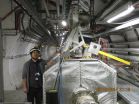Aspirin could hold the key to supercharged cancer immunotherapy
2015-09-03
(Press-News.org) Giving cancer patients aspirin at the same time as immunotherapy could dramatically boost the effectiveness of the treatment, according to new research published in the journal Cell today (Thursday).
Francis Crick Institute researchers, funded by Cancer Research UK, have shown that skin, breast and bowel cancer cells often produce large amounts of prostaglandin E2 (PGE2). This molecule dampens down the immune system's normal response to attack faulty cells, which helps cancer to hide. It is a trick that allows the tumour to thrive and may explain why some immunotherapy treatments have not been as effective as hoped.
Aspirin is part of a group of molecules called COX inhibitors, which stop the production of PGE2 and help reawaken the immune system. Combining immunotherapy with aspirin or other COX inhibitors substantially slowed bowel and melanoma skin cancer growth in mice, compared to immunotherapy alone*.
Study author Professor Caetano Reis e Sousa, senior group leader at the Francis Crick Institute, said: "We've added to the growing evidence that some cancers produce PGE2 as a way of escaping the immune system. If you can take away cancer cells' ability to make PGE2 you effectively lift this protective barrier and unleash the full power of the immune system.
"Giving patients COX inhibitors like aspirin at the same time as immunotherapy could potentially make a huge difference to the benefit they get from treatment. It's still early work but this could help make cancer immunotherapy even more effective, delivering life-changing results for patients."
Professor Peter Johnson, Cancer Research UK's chief clinician, said: "PGE2 acts on many different cells in our body, and this study suggests that one of these actions is to tell our immune system to ignore cancer cells. Once you stop the cancer cells from producing it, the immune system switches back to 'kill mode' and attacks the tumour.
"This research was carried out in mice so there is still some way to go before we will see patients being given COX inhibitors as part of their treatment. But it's an exciting finding that could offer a simple way to dramatically improve the response to treatment in a range of cancers."
INFORMATION:
Notes to Editors:
Zelenay, S. et al, 'Cyclooxygenase-dependent tumor growth through evasion of immunity'. Cell, 2015. DOI: 10.1016/j.cell.2015.08.015
*The type of immunotherapy tested was anti-PD-1. For more information on how these treatments work, you can read our blog and watch our animation on cancer immunotherapy:
http://scienceblog.cancerresearchuk.org/2014/06/02/new-immunotherapy-drugs-hit-the-headlines-how-do-they-work/
And:
https://www.youtube.com/watch?v=k41b40XYbXw
About the Francis Crick Institute
The Francis Crick Institute will be a world-leading centre of biomedical research and innovation. It will promote connections between researchers, between disciplines, and between academic institutions, healthcare organisations and businesses. Dedicated to research excellence, the institute will have the scale, vision and expertise to tackle challenging scientific questions underpinning health and disease.
Due to open in 2016, the Francis Crick Institute is a charity supported by the Medical Research Council, Cancer Research UK, the Wellcome Trust, UCL (University College London), Imperial College London and King's College London. It will be world-class with a strong national role - training scientists and developing ideas for public good. http://www.crick.ac.uk
About Cancer Research UK
Cancer Research UK is the world's leading cancer charity dedicated to saving lives through research.
Cancer Research UK's pioneering work into the prevention, diagnosis and treatment of cancer has helped save millions of lives.
Cancer Research UK receives no government funding for its life-saving research. Every step it makes towards beating cancer relies on every pound donated.
Cancer Research UK has been at the heart of the progress that has already seen survival in the UK double in the last forty years.
Today, 2 in 4 people survive their cancer for at least 10 years. Cancer Research UK's ambition is to accelerate progress so that 3 in 4 people will survive their cancer for at least 10 years within the next 20 years.
Cancer Research UK supports research into all aspects of cancer through the work of over 4,000 scientists, doctors and nurses.
Together with its partners and supporters, Cancer Research UK's vision is to bring forward the day when all cancers are cured.
For further information about Cancer Research UK's work or to find out how to support the charity, please call 0300 123 1022 or visit http://www.cancerresearchuk.org. Follow us on Twitter and Facebook.
ELSE PRESS RELEASES FROM THIS DATE:
2015-09-03
LAWRENCE - Men might want to ditch the pickup lines and polish their punchlines in their quest to attract women, new research at the University of Kansas suggests.
Jeffrey Hall, associate professor of communication studies, found that when two strangers meet, the more times a man tries to be funny and the more a woman laughs at those attempts, the more likely it is for the woman to be interested in dating. However, an even better indicator of romantic connection is if the two are spotted laughing together.
Those findings were among the discoveries Hall made in his search ...
2015-09-03
Coral Gables, Fla. (September 1, 2015) - Cognitive flexibility is the ability to shift our thoughts and adapt our behavior to the changing environment. In other words, it's one's ability to disengage from a previous task and respond effectively to a new one. It's a faculty that most of us take for granted, yet an essential skill to navigate life.
In a new paper published in the journal Trends in Neurosciences, University of Miami (UM) College of Arts & Sciences researchers clarify many of the concepts surrounding cognitive flexibility and propose a model of its underlying ...
2015-09-03
Researchers involved in an international collaboration across six institutions, including the University of Copenhagen and the National Aquarium of Denmark (Den Blå Planet), have successfully identified the exact composition of sea snake venom, which makes the future development of synthetic antivenoms more realistic. Currently, sea snake anitvenom costs nearly USD 2000, yet these new findings could result in a future production of synthetic antivenoms for as little as USD 10-100.
Venomous snakebites represent a major health concern in many tropical and subtropical ...
2015-09-03
Sea level rise poses one of the biggest threats to human systems in a globally warming world, potentially causing trillions of dollars' worth of damages to flooded cities around the world. As surface temperatures rise, ice sheets are melting at record rates and sea levels are rising.
But there may be some good news amid the worry. Sea levels may not rise as high as assumed.
To predict sea level changes, scientists look to Earth's distant past, when climate conditions were similar to today, and investigate how the planet's ice sheets responded then to warmer temperatures ...
2015-09-03
High blood sugar is a defining characteristic of Type 2 diabetes and the cause of many of the condition's complications, including kidney failure, heart disease, and blindness. Most diabetes medications aim to maintain normal blood sugar (glucose) levels and prevent high blood sugar by controlling insulin.
A new University of Iowa study shows that another biological checkpoint, known as the Mitochondrial Pyruvate Carrier (MPC), is critical for controlling glucose production in the liver and could potentially be a new target for drugs to treat diabetes.
The study, led ...
2015-09-03
LAWRENCE -- Researchers at the University of Kansas working with an international team at the Large Hadron Collider have produced quark-gluon plasma -- a state of matter thought to have existed right at the birth of the universe -- with fewer particles than previously thought possible.
The material was discovered by colliding protons with lead nuclei at high energy inside the supercollider's Compact Muon Solenoid detector. Physicists have dubbed the resulting plasma the "littlest liquid."
"Before the CMS experimental results, it had been thought the medium created in ...
2015-09-03
DARIEN, IL - A new study shows that high school students lose sleep on school nights following the change to daylight saving time that occurs in March. The loss of sleep during the school week was associated with a decline in vigilance and cognitive function, which raises safety concerns for teen drivers.
Results show that the average objectively measured sleep duration on the weeknights after the spring time change declined to 7 hours, 19 minutes, which reflects a mean loss of 32 minutes per night compared with the school week prior to the implementation of daylight ...
2015-09-03
MADISON, Wis. - Orchids, a fantastically complicated and diverse group of flowering plants, have long blended the exotic with the beautiful. Most species live on trees, often in remote, tropical mountains. Their flowers can be strange -- one even flowers underground, and many species deceive their pollinators into thinking they are good to eat.
Some are florist's staples, like phalaenopsis, the hot-pink and white flower that is easy to grow and easier to sell. Beyond the "job" of looking beautiful, only the vanilla orchids have any commercial role.
The estimated ...
2015-09-03
Repeated exposure to anesthesia early in life causes alterations in emotional behavior that may persist long-term, according to a study from the Icahn School of Medicine at Mount Sinai in collaboration with the Yerkes National Primate Research Center, and published in the Online First edition of Anesthesiology, the official medical journal of the American Society of Anesthesiologists®.
Each year, approximately one million children under the age of four undergo surgery with general anesthesia, according to the U.S. Food and Drug Administration (FDA). Retrospective ...
2015-09-03
A study that used stored blood samples from U.S. Air Force personnel who conducted aerial herbicide spray missions of Agent Orange during the Vietnam war found a more than 2-fold increased risk of the precursor to multiple myeloma known as monoclonal gammopathy of undetermined significance (MGUS), according to an article published online by JAMA Oncology.
While the cause of MGUS and multiple myeloma (plasma cell cancer) remains largely unclear, studies have reported an elevated risk of multiple myeloma among farmers and other agricultural workers and pesticides have ...
LAST 30 PRESS RELEASES:
[Press-News.org] Aspirin could hold the key to supercharged cancer immunotherapy


